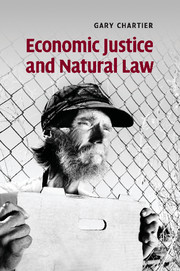4 - Remedies: property
Published online by Cambridge University Press: 18 December 2009
Summary
Different communities may well enforce different rules regarding the acquisition and transfer of property. But practical reason requires that every community's norms and rules provide for remedies of some kind for significant losses rooted in injustice. And it provides good reason for the recognition of some claims to property grounded in identity-constitutive relationships and for communities to reform property relations by reassigning titles in ways that acknowledge people's sweat equity and prevent wasteful inefficiencies.
In this chapter, I want to consider what remedies might be available in accordance with natural law for inequities related to rights in land and capital assets – among the kinds of property most important in determining people's economic conditions. I develop some general principles in Part I. In Part II, I elaborate several alternative bases for claims that peasants might make to agricultural land held by large landowners and for claims that workers might make to their workplaces. In Part III, I argue for the justice of reassigning title in some agricultural land to peasants. In Part IV, I argue that some workers have some basis for claiming property rights in their workplaces. In Part V, I maintain that it is unreasonable to reassign title to residential property from individual owners to developers for the purpose of, arguably, promoting a community's prosperity. I review my arguments in Part VI.
Principles for property reform
I will use the generic label property reform to refer to the reassignment of title to property as a way of correcting past injustice, ending ongoing injustice, or honoring people's investment in and attachment to property currently treated as belonging to others (especially when it has been abandoned, left uncultivated, or unjustly acquired or maintained).
- Type
- Chapter
- Information
- Economic Justice and Natural Law , pp. 123 - 154Publisher: Cambridge University PressPrint publication year: 2009



